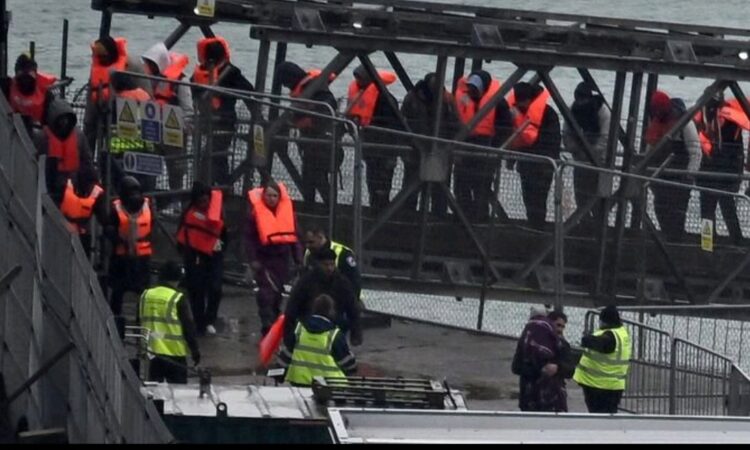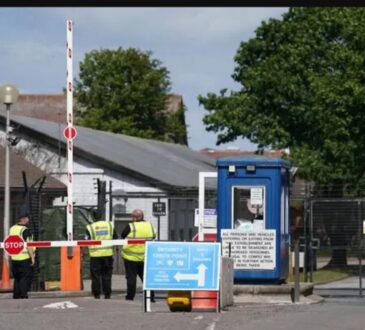Nearly 200 Illegal Migrants Crossed the English Channel on Monday – People Are Stunned After Noticing This One Shocking Detail

Nearly 200 migrants crossed the English Channel on Monday, taking advantage of improved weather conditions. A total of 183 people were packed onto three small boats, according to reports. This follows a significant increase in crossings over the weekend, with almost 600 people making the dangerous journey on Sunday alone. Smugglers are capitalizing on the calm seas in the busy shipping lanes, leading to a sharp rise in attempts to reach the UK.
So far this week, 843 migrants have successfully crossed the Channel in 15 boats, averaging around 56 people per vessel. This brings the total number of crossings in 2025 to 2,899 people from 54 boats, all arriving at the Port of Dover. The situation has raised concerns among officials, as the numbers are already higher than at the same time last year, when 2,225 migrants had made the journey.
The French authorities are under increasing pressure to prevent more crossings, especially as at least five people have died attempting the journey this year. French mayors have called for additional support to deal with the tragic consequences, including bodies washing up on their shores. In 2024, a total of 36,816 migrants reached the UK using 695 small, often unsafe inflatable boats.
Tony Smith, former Director General of the UK Border Force, has warned that the Channel migrant crisis is worsening. He highlighted that despite efforts by successive governments to reduce asylum applications, the situation has not improved. Smith pointed out that smugglers are exploiting weaknesses in the UK’s visa system, allowing them to deceive officials and facilitate illegal crossings.
Smith also noted the dire conditions in northern France, where hundreds of migrants are living in unsanitary camps without access to basic necessities like running water. Stéphane Pinto, the mayor of Ambleteuse, a town near Calais, has urged UK Prime Minister Sir Keir Starmer to visit the area and witness the situation firsthand.
In response to the escalating crisis, UK Home Secretary Yvette Cooper has announced new measures to deter illegal crossings and target people-smuggling networks. Under the proposed laws, migrants who refuse rescue by French authorities could face up to five years in prison. The new offense aims to address dangerous behavior, such as fighting with police, holding children over the edge of boats, or rushing vessels during launch attempts.
Additionally, individuals involved in selling or handling small boat parts, such as engines or life jackets, could face up to 14 years in prison. The Home Office plans to make it illegal to supply or handle items suspected of being used by organized crime groups. Officials believe these measures could even allow them to extradite and prosecute criminals operating in countries like Turkey.
Cooper emphasized that the new powers, modeled after counter-terrorism laws, will enable Border Force to identify, disrupt, and dismantle smuggling networks more effectively. Immigration officers and police will also be granted the authority to seize electronic devices, such as phones and laptops, before making an arrest if they suspect the devices contain information related to organized immigration crime.
Border Force officers often encounter what officials describe as “floating crime scenes,” where traumatized migrants are unable or unwilling to provide information about their journey. By allowing officers to seize devices before an arrest, authorities hope to gather crucial intelligence on smuggling operations without detaining the migrants themselves.
The proposed law changes aim to replicate powers under the Terrorism Act 2006, making it a criminal offense to prepare for a crossing or possess equipment like boats and life jackets if there is intent to use them for illegal Channel crossings.
The surge in crossings has sparked widespread concern, with officials warning that the numbers are likely to increase further as the weather improves. The UK government is under pressure to address the crisis, both by strengthening border security and working closely with French authorities to prevent departures from their shores.
Meanwhile, the human cost of the crisis continues to rise, with lives lost and vulnerable individuals risking everything in search of safety. As the situation unfolds, the focus remains on finding effective solutions to curb illegal crossings and dismantle the criminal networks profiting from this dangerous trade.




